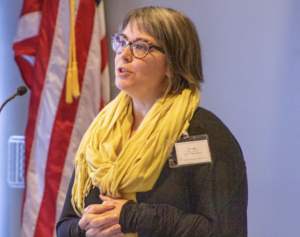JENNIFER KUZARA (2014)

CURRENT POSITION: Deputy Chief of Party for USAID’s Program Cycle Mechanism
FORMER POSITIONS:
Monitoring and Evaluation (M&E) Fellow, Expanding Monitoring & Evaluation Capacities (MECap)
Senior Program Officer, Cooperative for Assistance and Relief Everywhere (CARE)
Research Fellow, Centers for Disease Control and Prevention
EDUCATION:
PhD in Anthropology, 2014, Emory University
PUBLICATIONS:
PhD Dissertation
- (2014) Shifting Roles in Gender, Kinship, and the Household: Women’s Empowerment in Matrilineal Malawi. Emory Theses and Dissertations (ETD).
Articles
- (2018) Kuzara, Jennifer, Anne Woodriff Sprinkel, Feven Tassew Mekuria, Marcie Rubardt, Fodie Maguiraga, Koman Sissoko, Philip Hastings. Addressing social and gender norms to improve uptake of maternal health services in Mali: a descriptive study of CARE’s Project Hope for Mothers and Newborns (PEMN). Culture Health & Sexuality.
- (2010) Hahn, Robert Alfred, Jennifer Kuzara, Randy W. Elder, Robert Brewer, Sajal K. Chattopadhyay, Jonathan E. Fielding, Timothy S. Naimi, Traci Toomey, Jennifer Cook Middleton, and Briana Lawrence. Effectiveness of Policies Restricting Hours of Alcohol Sales in Preventing Excessive Alcohol Consumption and Related Harms. American Journal of Preventative Medicine.
- (2005) Worthman, Carol, and Jennifer Kuzara. Life history and the early origins of health differentials. American Journal of Human Biology.
BIOGRAPHY:
Dr. Jennifer Lynn Kuzara completed her PhD from Emory University in 2014 with mentorship from Dr. Carol Worthman, Dr. Melvin Konner, and Dr. Peter Brown. As indicated by Kuzara’s publications, she has a broad range of research interests ranging from topics of early life development to the study of social and gender norms affecting maternal healthcare. She also appears to be particularly interested in examining cultures from Malawi and from the Yanomami people.
Dr. Kuzara’s dissertation combines each of these interests as she employs methods from cultural anthropology towards understanding the role of gender, kinship, and social norms in influencing women’s empowerment in contemporary Malawi. To be more specific, Dr. Kuzara compares two distinct districts in Malawi: one being the historically matrilineal Chewa society, and the other being the patrilineal Ngoni society. She uses comparative ethnographic observations from the Chewa and the Ngoni to counter the popular narrative that matrilineal hierarchies prove detrimental to women’s empowerment and maternal health. One may conjecture that her research thus falls in line with emerging scholarship that dismantles historical claims of matrilineality as the scapegoat of household instability. Instead, Dr. Kuzara argues for the reconsideration of narratives that traditionally blame urban development for placing women in positions of household-headship and responsibility. She furthers her assertion by highlighting how matrilineality may actually serve to empower women by providing them with a means for independence when co-occuring with cultural gender norms that support female empowerment.
Upon completing her doctorate degree, Dr. Kuzara received a research fellowship to work as a community guide for preventative services at the Centers for Disease Control and Prevention. She has since served as a senior program officer for Cooperative for Assistance and Relief Everywhere (CARE), and currently works with Social Solutions International to provide support in strategic planning and in monitoring, evaluation, and learning to United States Agency for International Development (USAID) offices.

